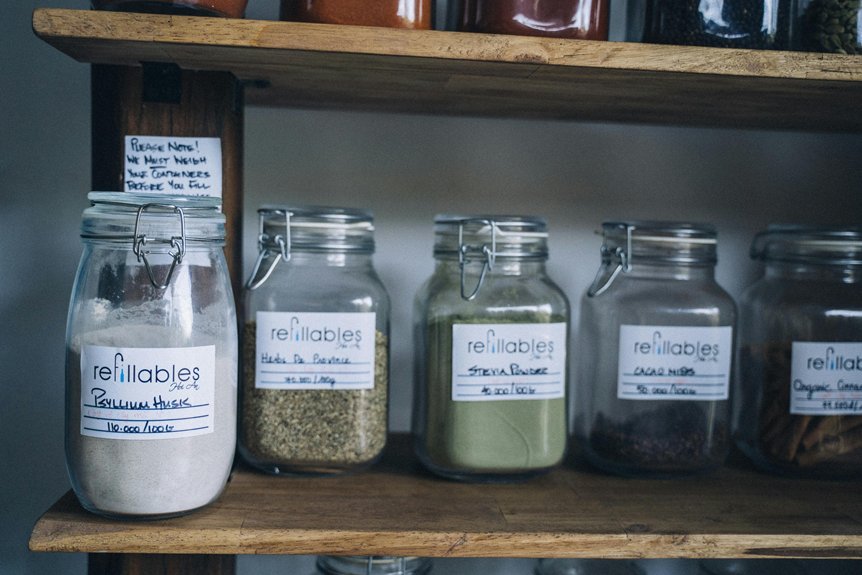
You might not realize it, but some everyday foods can silently disrupt your gut health. Refined sugars, processed snacks, and even dairy could be causing more harm than good. These culprits can lead to bloating, gas, and other digestive discomforts that you may just brush off. Understanding how these foods affect your gut is vital for your overall well-being. Curious about which specific items to watch out for? Let’s explore further.
Refined Sugars and Sweeteners
Refined sugars and sweeteners can wreak havoc on your gut health. When you consume these sugary substances, they disrupt the balance of your gut microbiome, promoting the growth of harmful bacteria.
This imbalance can lead to issues like bloating, gas, and even digestive disorders. You mightn’t realize that hidden sugars lurk in many foods, from sauces to snacks, making it easy to exceed your daily intake.
To protect your gut, start reading labels and opt for natural alternatives like honey or maple syrup in moderation. Incorporating more fiber-rich foods, such as fruits and vegetables, can also help counteract the negative effects of sugar. Additionally, consider supplements like Gundry MCT Wellness, which may support gut health and enhance metabolism.
Your gut will thank you for making these simple changes!
Processed Foods and Additives
While convenience often drives you to choose processed foods, these items can seriously compromise your gut health. Packed with preservatives, artificial colors, and flavors, many processed foods disrupt your gut’s natural balance.
These additives can irritate your digestive system, leading to bloating, gas, and discomfort. Additionally, they often lack essential nutrients, making it harder for your body to maintain a healthy microbiome.
Instead of reaching for those pre-packaged snacks, consider whole foods like fruits, vegetables, and nuts. Not only are they better for your gut, but they also provide the nutrients your body craves.
Dairy Products
If you’re a fan of dairy products, you might want to reconsider how they affect your gut health. Many people struggle to digest lactose, the sugar found in milk, leading to bloating, gas, and discomfort.
Even if you don’t notice immediate symptoms, dairy can contribute to inflammation in your gut, disrupting the balance of beneficial bacteria.
Processed dairy, like cheese and yogurt with added sugars or preservatives, can be even worse, as they often contain ingredients that irritate your digestive system.
If you suspect dairy might be causing issues, try switching to lactose-free options or plant-based alternatives. Monitoring your body’s response can help you make informed choices that support a healthy gut and overall well-being.
Gluten-Containing Grains
Many people don’t realize that gluten-containing grains, such as wheat, barley, and rye, can wreak havoc on gut health.
If you’ve been experiencing bloating, gas, or irregular bowel movements, these grains might be the culprits. Gluten can trigger inflammation in your gut, making it harder for your body to absorb nutrients properly.
Even if you don’t have celiac disease, you could still be sensitive to gluten. It’s worth paying attention to how your body reacts after consuming bread, pasta, or cereals.
Consider trying a gluten-free diet for a few weeks to see if your symptoms improve. By making this simple change, you might discover the key to better digestion and overall gut health.
Legumes and Pulses
Although legumes and pulses are often praised for their high protein and fiber content, they can also be problematic for your gut health.
These foods contain compounds called lectins and oligosaccharides, which can be tough for your digestive system to break down. If you’re not used to eating them, they can lead to bloating, gas, and discomfort.
To enjoy their benefits without the gut issues, try soaking beans and lentils before cooking. This can reduce those troublesome compounds and make them easier to digest. Gradually increasing your intake can also help your gut adapt.
Artificial Ingredients and Preservatives
When you reach for processed foods, you mightn’t realize that artificial ingredients and preservatives can wreak havoc on your gut.
These chemicals, often used to enhance flavor, texture, or shelf life, can disrupt your gut microbiome, leading to inflammation and digestive issues. Common culprits include artificial sweeteners, colors, and flavorings, which your body may struggle to break down.
Instead of providing nourishment, they could contribute to bloating, gas, or even cravings for more unhealthy foods.
To protect your gut health, opt for whole, unprocessed foods whenever possible. By reading labels carefully and choosing products with fewer artificial additives, you can support a healthier digestive system and feel better overall.
Your gut will thank you!
High-Fat Diets
While high-fat diets may seem appealing for quick weight loss or energy boosts, they can seriously disrupt your gut health. Consuming excessive saturated fats can lead to an imbalance in your gut microbiome, promoting the growth of harmful bacteria. This imbalance may cause bloating, gas, and even digestive disorders.
Additionally, high-fat diets often lack fiber, which is vital for maintaining a healthy gut. Without fiber, your digestive system struggles to function properly, leading to constipation and other issues.
If you’re considering a high-fat diet, it’s essential to include healthy fats like avocados, nuts, and olive oil while also prioritizing fiber-rich foods. Striking this balance will help you enjoy the benefits without compromising your gut health.






